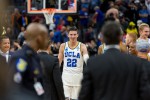D’Angelo Russell, Ben Simmons and Markelle Fultz.
All three NBA players were – or in Fultz’s case, will be – highly touted high school recruits and top-two NBA draft picks after spending only one year in college. But what also sets them apart from their one-and-done brethren is that none of them played on an elite, championship-caliber squad.
Simmons became the first-ever No. 1 NBA draft pick who didn’t reach the NCAA Tournament last year at LSU, while Russell’s Ohio State team was a No. 10 seed that lost in the second round. Fultz’s Washington Huskies, meanwhile, finished 9-22.
Their obvious talents combined with their schools’ suboptimal results play into the age-old questions surrounding the necessity of the NBA’s one-and-done rule. If the players will head straight for the league and not even bother finishing the year – ahem, Lonzo Ball, T.J Leaf and Ike Anigbogu – why should the NBA mandate that they spend one year between graduating high school and turning pro?
One answer: the college student fan experience.
We all saw the difference between the student attendances at UCLA basketball home games the last two seasons. When the Bruins went 15-17 and didn’t qualify for any postseason tournaments, I could have walked to the northwest gate like Pauley Pavilion was an airport in the 1990s. This year, Den Pass holders waited in line for longer than they would wait in traffic trying to catch a Friday evening flight at LAX.
Having future NBA superstars stay a semester or a couple quarters in college helps usher in a new sector of fans, one that is more likely to follow that player’s progress rather than how good his team is.
Even if students have no idea what’s going on in a basketball game, they still recognize the big names and may feel tempted to buy their jerseys, all in the spirit of “I once took an oceanography class with Lonzo and T.J. so we’re basically friends.”
For schools, if students fill an arena to watch a specific player, recruits notice the atmosphere, and the support will make them more likely to commit. The opposite is also true, too – just ask all those UCLA football de-commits.
In the era of never-ending YouTube highlight videos for all the top high school prospects, the one-and-done rule also helps prepare them for the media and fan attention they’ll receive in the NBA.
For most of the recruits, college will be the first time they regularly play in front of 10,000-plus people. If players can handle thousands of drunk, screaming college students, they should have no problem dealing with thousands of drunk, screaming middle-aged fans.
There’s also no reason to extend the one-year mandate. These basketball players stand to earn millions in endorsements and contracts the minute they leave college. After they serve their time as amateurs, they should be able to choose if they want to finally start making money for themselves.
So for the sake of three-hour lines and the future of The Den, please Commissioner Adam Silver, don’t change the one-and-done rule.

Wang, you are so wrong. If you really cared about the athletes UCLA or college basketball you would never have written that column.